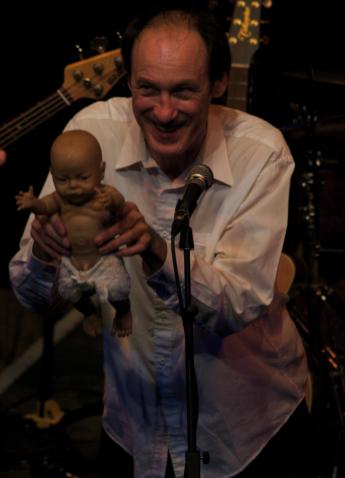Search
Rychard Carrington and Patrick Widdess report on John Otway – The Junction, Cambridge 21 November 2008

Patrick saw Otway for the first time:
I feel a distinct newcomer as fans stand about in the bar before the gig wearing his T-shirts and chatting with John himself, who mingles before the show starts in leisurely fashion. John comes across as a clumsy amateur but soon shows himself to be an extremely capable musician, able to do a summersault mid-song, guitar in hand and not miss a beat. The band are equally proficient though they look like the kind of group you'd expect to find playing covers in the pub at the weekend. This was never going to be a regular night at the local though. After all the band have had two top forty hits. One for each half of the set!
In addition to original Otway songs there are various covers including Crazy Horses with theremin and a hecklers' version of House Of The Rising Sun. It's John's onstage antics that make the show special though. There are the silly dances, the hands free microphone holder fashioned from coathangers, and insane acrobatics on a stepladder. During a heavy metal number they go for all out rock cheesiness. They jostle in gentlemanly fashion for foot space on the monitors, belt out increasingly fast and complex solos, and as the lead guitarist mounts the stepladder play with their guitars behind their heads in unison.
John Otway is an unlikely pop star full of contradicting idiosyncrasies. His lengthy between song banter is by turns smug, boastful and self-deprecating. It's all tongue in cheek yet somehow sincere. Every generation produces a few talented, eccentric and totally unique individuals. John is one of them. A national treasure at the top of his stepladder.
Rychard saw Otway for about the fiftieth time:
This isn't my first Otway review (for instance, there's this one and this one and this one), and it might well not be my last. What can I say that's new? Well, ‘The set remains the same' is an old Otway joke, but actually there are variations, and it's these that I find most interesting, much as the old reaffirmations of the faith - Really Free, Beware Of The Flowers, Bunsen Burner, The House Of The Rising Sun, Cheryl's Going Home - are joyous tribal celebrations. This was Otway's third appearance in Cambridge this year: the first was completely solo, the second with Wild Willy Barrett, and now this one with his ‘Big Band' of Richard Holgarth (lead guitar), Murray Torkildsen (rhythm guitar and stylophone), Seymour (bass) and Adam Batterbee (drums) - a line-up unchanged in fifteen years. Great though Willy Barrett is, the comparisons bring out the strengths of the Big Band. Otway's style is enhanced by the pathos of pop and the power of rock, and his persona is enhanced by the support of a gang of mates who take the piss but you know they love him really (with Barrett, you're really not so sure). Telex and Mass Communication made reappearances after twenty-five years - the in retrospect naïve, energetic celebrations of the information technology of their day were somehow in keeping with the whole show. It was quite refreshing that Blockbuster was given a rest, as was the double-bodied guitar, while the coathanger microphone-holder had been reinforced by taping another coathanger to it - the microphone did used to fall out rather often, in the previous version. But the stepladder was back in no uncertain terms. That was what was missing in the recent Goldfrapp show, I now realise - for all the svelte slickness, Alison Goldfrapp didn't jump off a stepladder and attempt somersaults during her songs.
Otway is the Don Quixote of pub rock. In some ways he's so ordinary, so much one of us, in other ways he's instinctively eccentric. His substantial, distinctive presence in the lives of his big fans, his role as a seemingly permanent fixture, but one that ages gradually as we do, enhances the pathos of his songs, which have either a gauche vitality more rousing than a classic rock anthem (Beware Of The Flowers, We Rock), or a gauche tenderness more moving than a classic slushy ballad (Josephine, Geneve [whose misspelling is so characteristic]). ‘Most of my love songs have been written after my lover has left me. But there's just a quick window of opportunity to write one while she's still around.' is how Otway introduced Best Dream. I can't imagine Alison Goldfrapp saying that. Yet, adept though Otway is at making virtues out of his weaknesses, crucial though the elements of folly, self-deprecation and childlike clumsy exuberance are to his act, beneath all of that are touchingly sincere feelings, expressed as great pop music. A clown? Yes. A hero? Definitely. A great singer? In his way, yes. A great songwriter? Yes, that too. In the words of The Morning People, he did something with his life.
Writers: Rychard Carrington and Patrick Widdess
Photo: Patrick Widdess